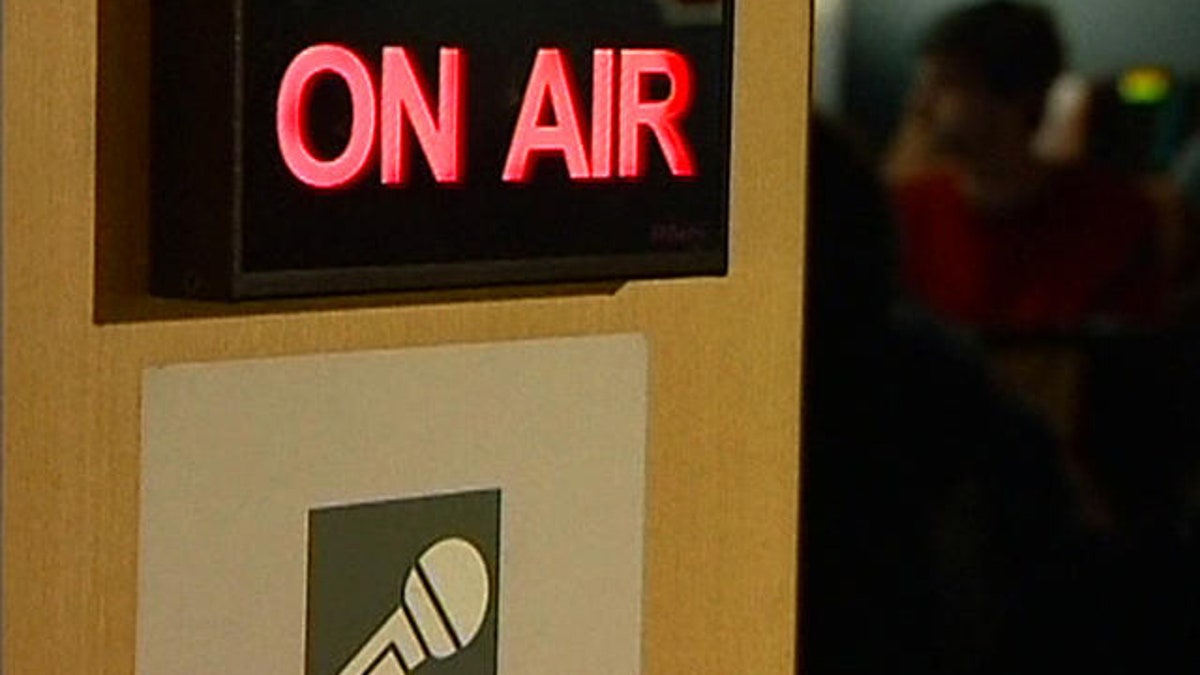
(AP)
The Federal Communications Commission may have killed off the controversial Fairness Doctrine this week, but conservatives -- offering faint praise for the move -- are sounding the alarm over what they see as backdoor attempts by the Obama administration to regulate political speech on the airwaves.
They point to ownership diversity and "localism" as other ways Democrats can try to keep the spirit of the Fairness Doctrine alive and silence conservatives and Christian broadcasters.
“The path to censor radio airwaves is being paved through the back door,” Media Research Center President Brent Bozell said.
But some analysts say these fears are overblown because none of the other proposals rise to the level of censorship.
“They are impediments to the open market of ideas,” said Michael Tanner, senior fellow at the Cato Institute. “But they’re not the same as direct censorship as the Fairness Doctrine itself.”
The Fairness Doctrine was adopted in 1949 and required licensed broadcasters to share airwaves equally for competing political points of view. At the time of its creation, only 2,881 radio stations existed, compared with roughly 14,000 today.
The doctrine was revoked in 1987, but many conservatives feared that it would be resurrected as a way to break its dominance in talk radio.
But on Monday, the FCC put the final nail in the coffin by striking it from its books as part a larger mandate proposed by the Obama administration to ease regulatory burdens by getting rid of duplicative or outdated measures.
“The FCC deserves a one-handed round of applause for this move,” Bozell said.
“Years ago, striking the Censorship Doctrine – and that’s exactly what the Fairness Doctrine was – would have actually meant something,” he said. “But since the FCC started playing with policies of ‘localism,’ ‘media diversity’ and a nebulous requirement to ‘serve the public interest,’ with yet another unelected and unconfirmed ‘Diversity Czar’ to implement these proposed regulations, the spirit of the Censorship Doctrine has remained very much alive.
The National Religious Broadcasters Association also expressed caution about the end of the Fairness Doctrine.
“On this day of genuine celebration, NRB will remain vigilant regarding the concepts embodied in the Fairness Doctrine,” said Frank Wright, the association’s president and chief executive. “While the letter of the law is now dead, we want to ensure that the spirit of this particular law also remains dead. There are many voices calling for increased scrutiny of broadcast programming under the guise of ‘localism,’ and we see such proposals as a Fairness Doctrine in different garb.”
Although localism, diversity and competition have been part of the FCC’s mission from the beginning, the agency has launched new initiatives in recent years to meet those goals in a rapidly changing era of mergers and advanced technology.
FCC Commissioner Michael Copps urged his colleagues to "breathe new life" into that mission this week.
"I'm not sure we had to kill the Fairness Doctrine twice; it was already a dead letter," he said in a statement.
"Frankly, I think we should focus on tackling the very live challenges that face broadcast news in the 21st century: where have all the journalists gone and why?" he said. "Whatever happened to the kind of fact-filled investigative journalist that held the powerful accountable? Why do so many important stories go untold?
"Part of the shortfall has been an FCC that has been asleep at the switch for the better part of 30 years in meeting its statutory public interest oversight responsibilities," he added."
One of the recent proposals that emerged from localism proceedings that began in the past decade is requiring local media outlets across the country to establish community advisory boards to monitor what those local stations air and advise them what programming could cover “issues of importance” to the community.
But in June, a staff report recommended terminating the localism proceeding.
The agency is also weighing recommendations from its diversity committee on how to increase the number of women and minority radio broadcast owners, which is only 3.9 percent, an FCC official told FoxNews.com.
The committee has recommended allowing companies to exceed the number of stations they can acquire in any given market if they establish an “incubator program to promote ownership by disadvantaged businesses.”
But conservatives have targeted the FCC’s diversity officer, Mark Lloyd, who they believe is focused on limiting their voice.
Lloyd authored an essay in 2007 entitled “The Structural Imbalance of Political Talk Radio,” and a followup called “Forget the Fairness Doctrine,” in which he argued that the rise and influence of Rush Limbaugh and other conservative radio hosts were traced to “relaxed ownership rules” and other pro-business regulation that destroyed localism.
But Tanner noted that Lloyd has “not done anything” since Obama appointed him to the office two years ago.
Tanner said while localism can be impediment, it doesn’t have a direct impact on content.
“That said, it’s possible that could be abused to not to be content-neutral,” he said. “But that’s an abuse of the statue, not the statue itself, which is content-neutral.”




